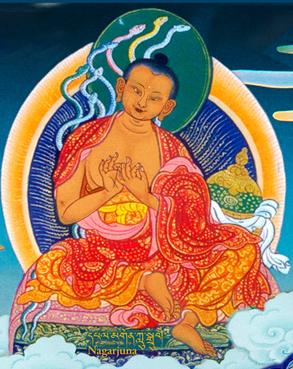
VII.1.
But if origination is a non-composite, then how could there be characteristics of a composite product?
VII.2.
If united in a composite product, how could they all be at one place at one time?
VII.3.
It is an infinite regress. If this is not so, they are not composite products.
VII.4.
Also the origination of the basic origination produces the “originating origination.”
VII.5.
How, according to you, will this originating origination produce that basic origination if it itself is not produced by basic origination?
VII.6.
How does the basic origination, which is yet un-produced by that originating origination, cause that originating origination to be originated?
VII.7.
If this, not being produced, would be able to cause origination.
VII.8.
As a light is the illuminator of both itself and that which is other than itself,
So origination would originate both itself and that which is other than itself.
VII.9.
There is no darkness in the light and there where the light is placed.
What could the light illumine? Indeed illumination is the getting rid of darkness.
VII.10.
When the light, being originated, does not come in contact with darkness?
VII.11.
A light placed here will destroy the darkness of the entire world.
VII.12.
Then, without a doubt, darkness will cover both itself and that which is other than itself.
VII.13.
And if it has already originated, when it is being produced, what is produced after that which is already produced?
VII.14.
by what is being originated,
by what is already originated,
or by what is not yet originated —
Just as it has been said in the analysis of “presently going to,” “that which is already gone to ” and “that which is not yet gone to.”
VII.15.
How can one say: That which is being originated exists presupposing that which is produced?
VII.16.
As there is an allayment of “being originated,” so also of that which is originated.
VII.17.
That thing will be originated. What originates if it does not exist?
VII.18.
What origination, in turn, would originate that origination?
VII.19.
But if non-origination is that which is origination, then everything without qualification would originate.
VII.20.
Nor that what has not originated either exists or does not exist; this has been demonstrated earlier.
VII.21.
And whatever is not being destroyed, that entity is not possible.
VII.22.
Not even something enduring endures.
And what endures if it is not originated?
VII.23.
But whatever is not being destroyed, that thing is also not possible.
VII.24.
What entities are there which endure without old age and death?
VII.25.
So the origination of origination is neither itself nor that which is other than itself.
VII.26.
Nor even “that which is ceasing.”
For, what can cease if it is produced?
VII.27.
Moreover, cessation of a non-enduring entity is not possible.
VII.28.
And a different state of existence does not cease because of a different state.
VII.29.
Then neither is the cessation of all dharmas possible.
VII.30.
And certainly both an existing entity and a non-existing entity cannot be possible in the same case.
VII.31.
Just as there is no second decapitation!
VII.32.
Just as there is no origination of origination by itself nor by another.
VII.33.
And if a composite product is not proved, how can a non-composite product be proved?
VII.34.
Just so should we consider origination, duration, and cessation.
Source: Orientalia




